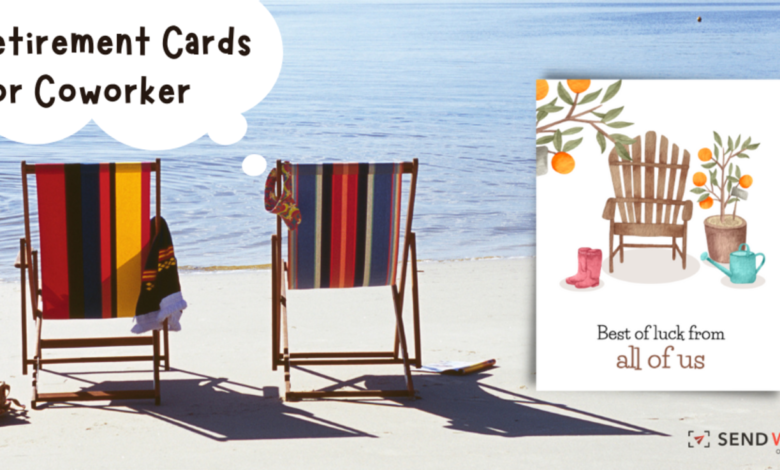
Retirement cards are often seen as a mere formality – a colorful piece of paper with generic well-wishes. But beneath the surface lies a fascinating interplay of emotions and psychological effects that can significantly impact the well-being of retirees. Let’s delve into the world of retirement cards and explore their subtle yet powerful influence on the minds and hearts of those stepping into this next chapter.
1. Affirmation and Appreciation:
For many retirees, leaving behind a long career can be tinged with bittersweet emotions. Years of dedication, effort, and contribution can suddenly feel unacknowledged. A well-crafted retirement card, brimming with genuine appreciation and recognition, can be a powerful antidote to this sense of loss. Seeing their efforts acknowledged and valued offers retirees a much-needed dose of psychological validation and boosts their overall well-being.
2. Fostering Connection and Belonging:
Retirement can often feel isolating. The sudden disconnect from the daily rhythm of work and the familiar routine of colleagues can trigger feelings of loneliness and a sense of detachment. A retirement card, with its personal message and well wishes, serves as a bridge, reminding the retiree that they are still connected and valued members of their community. Sharing memories and expressing excitement for their future fosters a sense of belonging and continuity, assuring them that they are not alone in this transition.
3. Igniting Hope and Inspiration:
While some embrace retirement as a time to relax and unwind, others may grapple with feelings of uncertainty and a lack of purpose. A thoughtful card that acknowledges their dreams and aspirations can be a spark of hope and inspiration. Sharing stories of successful retirees who found new passions in their post-work life can ignite a sense of excitement and possibility, encouraging them to embrace the opportunities that lie ahead.
4. Processing Loss and Nostalgia:
While retirement brings new beginnings, it’s natural to feel a pang of nostalgia and loss for the familiar routines and colleagues left behind. A retirement card can provide a space to acknowledge these emotions. Sharing fond memories and expressing gratitude for the shared experiences can be a cathartic experience, allowing the retiree to process their feelings and move forward with acceptance.
5. The Power of Humor and Lightheartedness:
Retirement doesn’t have to be a somber affair. A card filled with humor and lightheartedness can inject some much-needed joy into this transition. Sharing funny anecdotes or inside jokes can evoke happy memories and create a sense of camaraderie, reminding the retiree that even in retirement, life is full of laughter and good times.
6. A Beacon of Recognition and Validation:
For many retirees, the end of a long career can be tinged with bittersweet emotions. Years of dedication have been poured into their work, and suddenly, the familiar structure and sense of purpose are gone. A heartfelt retirement card can be a powerful balm to this emotional shift. A sincere message acknowledging their contributions and expressing genuine appreciation can be a source of immense joy and validation.
7. A Bridge Across the Gap of Change:
Retirement can feel isolating, a sudden disconnect from the professional community and the daily rhythm of work life. A retirement card, with its personal message and well wishes, acts as a bridge, reassuring the retiree that their connections remain strong. Sharing memories and expressing excitement for their future can foster a sense of continuity and belonging, assuring them that they’re not alone in embarking on this new chapter.
The Key to Impact: Authenticity and Personalization
Ultimately, the psychological impact of a retirement card hinges on its authenticity and personalization. A generic message, however well-meaning, will fall flat. Taking the time to personalize the card with specific memories, heartfelt wishes, and genuine appreciation demonstrates that you care, leaving a lasting impression that transcends the printed words.
Remember:
- Think beyond the generic messages. Instead of “Wishing you a happy retirement,” consider a message that acknowledges their specific contributions and expresses your personal well wishes.
- Share unique memories and inside jokes. This personalizes the card and reminds the retiree of the positive impact they had on your life.
- Be mindful of their emotions. Some may feel excited, while others may feel apprehensive. Tailor your message to their emotional state.
- Make it creative and heartfelt. Handwritten messages, photos, or even DIY cards can make a bigger impact than store-bought ones.
By understanding the psychological impact of retirement cards and crafting messages with care, we can turn these seemingly simple pieces of paper into powerful tools to boost the well-being of retirees, celebrate their contributions, and pave the way for a joyful and fulfilling next chapter. So, the next time you pick up a retirement card, remember – it’s more than just ink and paper. It’s an opportunity to touch hearts, build bridges, and offer a beacon of hope in a time of transition.



